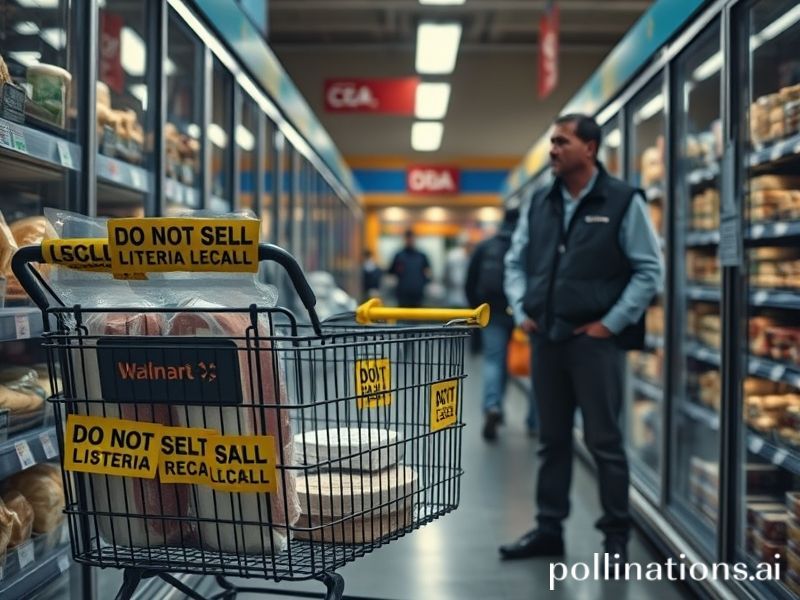Global Shrimp Recall: Walmart’s Listeria Scare Proves Germs Don’t Need Visas
Walmart Recalls Frozen Shrimp—Again—Because Listeria Never Got the Memo About Borders
By our man in Geneva, where even the caviar has trust issues
GENEVA—When Walmart announced last week that it was recalling 8,000 cases of “Aqua Star Cooked, Peeled & Deveined Tail-On Shrimp” for possible Listeria contamination, the corporate press release came wrapped in the usual corporate cotton wool: no illnesses reported, “abundance of caution,” blah-blah-blah. Translation: somewhere between a Vietnamese processing plant, a Californian cold-chain warehouse, and your Aunt Linda’s air fryer in Arkansas, a hardy little bacterium hitched a ride on cocktail-hour crustaceans and showed just how flimsy the 21st-century food safety net really is.
Listeria, for the uninitiated, is the microbial equivalent of that one friend who shows up uninvited, drinks all your wine, and then crashes on the couch for six weeks. It thrives at refrigerator temperatures, which is Mother Nature’s idea of a practical joke on anyone who believes “keep cold” is synonymous with “keep safe.” For the elderly, pregnant, or immunocompromised, it can turn a pleasant shrimp taco Tuesday into a weeks-long tango with sepsis. For the rest of us, it’s another reminder that globalization has turned dinner into a game of Russian roulette—only the gun is made in China, the bullets are farmed in Thailand, and the instructions are printed in six languages, none of which quite explain how to avoid dying.
The recall itself is geographically promiscuous. The shrimp were sold in Walmart stores across 28 U.S. states, but the supply chain stretches from India to Ecuador, with a layover in a distribution hub in sunny Calexico. If you’re reading this in London, Mumbai, or São Paulo, you might smugly assume the contagion stops at U.S. customs. Alas, the same supplier, Thai Union, ships to dozens of countries under different labels. One country’s recall notice is another country’s “limited market withdrawal”—bureaucratic speak for “we’re quietly hoping no one notices.”
Meanwhile, the World Health Organization estimates that 600 million people—roughly one in ten humans—fall ill each year from contaminated food. That’s the entire population of North America plus a bonus Mexico, all doubled over with stomach cramps for the crime of trusting the global dinner plate. And yet, we continue to treat food safety like a local zoning issue rather than the planetary circulatory system it has become. The U.N.’s Codex Alimentarius Commission meets in Rome every year to harmonize standards, which sounds reassuring until you realize that “harmonize” is diplomat-speak for “let’s agree to disagree, but politely.”
Back in Bentonville, Walmart’s crack risk-management team is busy drafting a PowerPoint that will never see daylight, featuring slides titled “Lessons Learned” and “Stakeholder Alignment.” Somewhere in the appendix, a bullet point notes that this is the third shrimp recall in 18 months. Another bullet—probably in Comic Sans—reminds executives that litigation costs are still cheaper than end-to-end supply-chain traceability. Investors, bless their efficient hearts, barely blinked; the share price dipped 0.3 percent, a rounding error in the grand casino of American capitalism.
The broader significance? We’ve built a world where your supermarket freezer is a miniature United Nations of risk. A single bag of frozen shrimp can contain traces of antibiotics banned in the EU, labor practices that would make a 19th-century robber baron blush, and carbon footprints large enough to require their own passport. And still, the checkout line hums along to the soothing muzak of consumer confidence.
So what’s a conscientious shopper to do? Grow your own shrimp? Good luck explaining that to the condo board. Short of a PhD in supply-chain forensics, the best defense may be the oldest: cook the hell out of everything, cross your fingers, and keep health insurance paid up. Because if history is any guide, the next recall notice is already incubating—somewhere between a factory floor and your dinner plate, biding its time, passport stamped and ready to travel.
After all, Listeria, like capitalism, abhors a vacuum—and a border.







